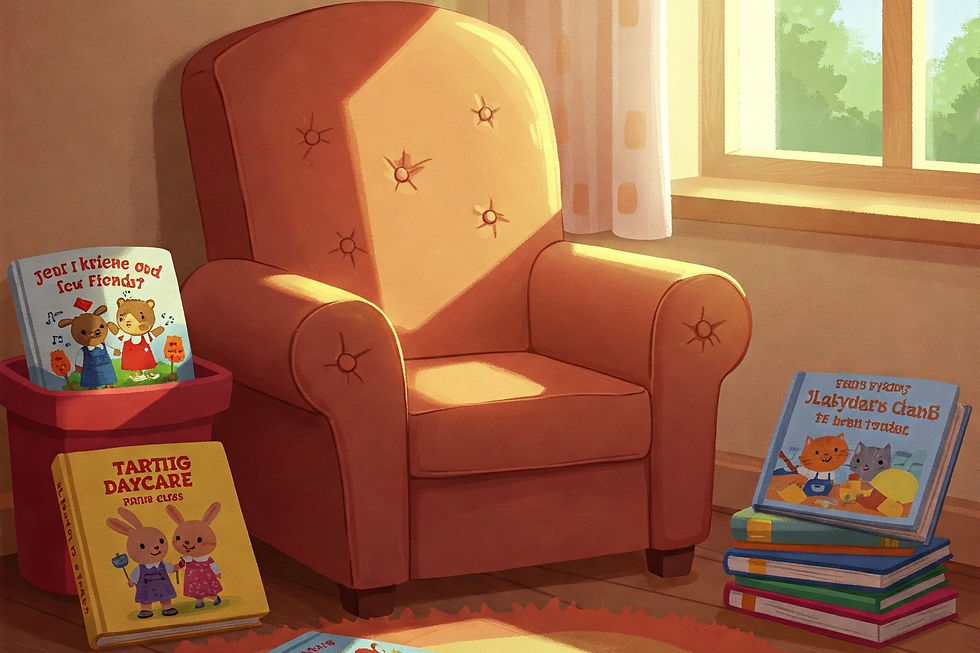The Power of Music: Harmonizing Child Development
- Marshall Chadbourne
- Nov 21, 2024
- 3 min read

Music. It's the universal language, a source of joy, comfort, and inspiration. But did you know that music is also a powerful tool for nurturing young minds? From lullabies that soothe babies to sing-alongs that get toddlers grooving, music plays a vital role in child development.
In this blog post, we'll explore the ways music enriches children's lives, from boosting language skills and cognitive development to fostering creativity and emotional expression. Get ready to turn up the volume and discover the harmonious benefits of music for your little ones!
A Symphony of Benefits: How Music Enhances Child Development
Think of music as a multivitamin for the developing brain. It nourishes a wide range of skills and abilities, setting the stage for future learning and success. Let's explore some of the key benefits, backed by research:
Language Development: Music and language are intertwined. The rhythm, rhyme, and repetition in songs help children develop phonemic awareness, vocabulary, and listening skills, as highlighted in a study by Kraus and Chandrasekaran (2010) published in Nature Reviews Neuroscience.
Cognitive Development: Music stimulates the brain, enhancing memory, attention, and problem-solving abilities. This is supported by research from the Center on the Developing Child at Harvard University, which emphasizes the role of music in building crucial neural connections.
Motor Skills: From clapping to dancing, music encourages movement and coordination, strengthening both fine and gross motor skills. A study by Zatorre, Chen, and Penhune (2007) in Nature Reviews Neuroscience explores the link between music and motor control.
Creativity and Imagination: Music sparks creativity and imagination, providing a canvas for self-expression and exploration. This is echoed in the work of Hodges (2000) in the International Journal of Music Education, which discusses the role of music in fostering creative thinking.
Emotional Development: Music provides a language for emotions, helping children identify, express, and regulate their feelings. This is supported by research from the National Association for Music Education (NAfME), which highlights the connection between music and emotional intelligence.
Social Skills: Singing, dancing, and playing music together foster cooperation, turn-taking, and communication skills. This is emphasized in a study by Custodero (2012) in Music Educators Journal, which examines the social benefits of group music-making.
Creating a Musical Playground: Tips for Parents
You don't need to be a musician to bring the joy of music into your child's life. Here are some simple ways to create a musical playground at home:
Sing, Sing, Sing: Sing lullabies, nursery rhymes, and silly songs throughout the day. Make up your own songs about everyday activities like brushing teeth or getting dressed.
Dance It Out: Put on some music and let loose! Encourage your child to move and groove to the rhythm, expressing themselves through dance.
Explore Instruments: Introduce your child to a variety of instruments, from shakers and drums to xylophones and keyboards. Let them experiment with different sounds and rhythms.
Attend Concerts and Performances: Expose your child to live music, whether it's a children's concert, a local band, or a family sing-along.
Make Music a Part of Your Routine: Play music during mealtimes, bath time, or playtime. Create a special playlist for different moods and activities.
Beyond the Home: Music Education and Beyond
As your child grows, consider enrolling them in music classes or lessons. Early exposure to formal music education can further enhance their musical abilities and provide a foundation for future learning.
But the power of music extends far beyond just learning to play an instrument. It can be a source of comfort, joy, and connection throughout life. So, turn up the volume, embrace the rhythm, and let the music play!




Comments